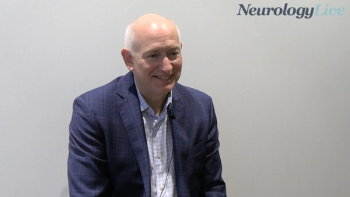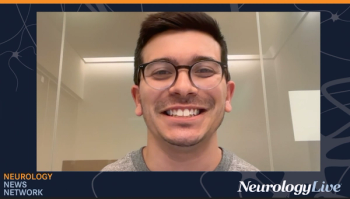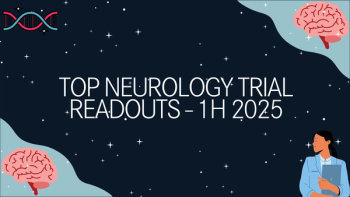
Julie Flygare, JD, president and CEO at Project Sleep, discussed the critical role of social connections and peer support in helping individuals with sleep disorders navigate their diagnosis.

Julie Flygare, JD, president and CEO at Project Sleep, discussed the critical role of social connections and peer support in helping individuals with sleep disorders navigate their diagnosis.

The director of the Montefiore Headache Center at Albert Einstein College of Medicine discussed the recent FDA approval of a new migraine treatment that combines rizatriptan and meloxicam. [WATCH TIME: 5 minutes]

SPN-830 is a wearable subcutaneous infusion device designed to deliver continuous treatment throughout the waking day, ensuring more consistent control of OFF time.

A group of empowering women leaders in neurology explore the transformative impact of women neurologists on the medical workforce and the strides toward a more inclusive neurology field.

UCB’s rozanolixizumab introduces two new self-administration methods, empowering patients with generalized myasthenia gravis (gMG) to manage their treatment with greater independence and control.

Deborah Benzil, MD, FAAS, vice chair of neurosurgery at Cleveland Clinic's Center for Spine Health, shared her extraordinary journey of resilience, from overcoming repeated rejections to becoming a trailblazer for women in neurosurgery, and reflects on the progress made and the challenges that remain.

Jacqueline A. French, MD, a professor of neurology at the NYU Grossman School of Medicine, provided clinical perspectives on her experiences and career growth in neurology amid National Women Physicians Day.

Jean Hubble, MD, a retired movement disorder specialist and consultant to the PMD Alliance, shares her reflections on National Women Physicians Day, the unique contributions of women in neurology, and the pathways to fostering future leaders in movement disorders care.

A group of empowering women leaders in neurology explore the transformative impact of women neurologists on the medical workforce and the strides toward a more inclusive neurology field.

Here's some of what is coming soon to NeurologyLive® this week.

A large registry-based study analyzed treatment patterns and attack risks in neuromyelitis optica spectrum disorder and myelin oligodendrocyte glycoprotein antibody-associated disease.

The chair of psychiatry at Tufts University School of Medicine discussed ongoing research exploring the potential of cannabinoids in treating agitation in Alzheimer disease. [WATCH TIME: 5 minutes]

Neurology News Network. for the week ending February 2, 2025. [WATCH TIME: 4 minutes]

Test your neurology knowledge with NeurologyLive®'s weekly quiz series, featuring questions on a variety of clinical and historical neurology topics. This week's topic is on Pompe disease.

A unique case highlighted the complex interplay between NMOSD and other autoimmune diseases, demonstrating the challenges in diagnosing and managing the condition.

Neal K. Shah talked about an artificial intelligence innovation that can be used to fight denied health insurance claims, thus improving revenue cycle management for physicians' practices and the patient experience.

Take 5 minutes to catch up on NeurologyLive®'s highlights from the week ending January 31, 2024.

The medical director of the Arkansas Children’s Comprehensive Epilepsy Program detailed advancements and strategies in using neuromodulation for LGS, as well as the future research needed to expand these approaches. [WATCH TIME: 4 minutes]

Cognitive behavioral therapy for insomnia, a multicomponent psychotherapy, consists of sleep restriction, stimulus control, cognitive restructuring, relaxation training, and sleep hygiene.

Suzetrigine, a selective inhibitor of the NaV1.8 sodium channel, offers an alternative opioid treatment option for patients to treat moderate to severe pain without risk of addiction.

Recent results from a phase 2 trial of ATH434 revealed its potential in reducing brain iron accumulation and preserving motor function in early-stage multiple system atrophy.

Findings from previous phase 3 trial showed that treatment with AXS-07 resulted in significant reductions in headache pain freedom, migraine symptoms, and rescue medication use.

The initial cohort of the EPISOD1 trial demonstrated no significant safety concerns for AMT-162, enabling progression to the next dose-escalation phase.

A new study identified key clinical and ultrasound markers that improved the differentiation between 2 conditions with overlapping features.

The chief medical advisor at the Muscular Dystrophy Association shared key highlights of what attendees can expect at the 2025 MDA Clinical and Scientific Conference. [WATCH TIME: 4 minutes]

Significant improvements were observed in depression and patient satisfaction with fascia exercises compared to conventional physiotherapy.

The chief of neuroinfectious diseases and global neurology at Northwestern Medicine talked about a relatively new autoimmune condition, marked by mitochondrial dysfunction. [WATCH TIME: 2 minutes]

Explore some of the most highly anticipated clinical trials with data readouts expected in the second half of 2025—key updates that researchers and clinicians in neurology won’t want to miss.

The submission was based on promising data from a phase 3 and phase 2 study, where treatment with apitegromab led to significant improvements in motor function among patients with SMA on SMN-targeted treatments.

A duo of experts discussed the importance of addressing barriers such as provider comfort, access to genetic counselors, and insurance coverage to reduce diagnostic latency and standardize genetic testing for epilepsy. [WATCH TIME: 5 minutes]